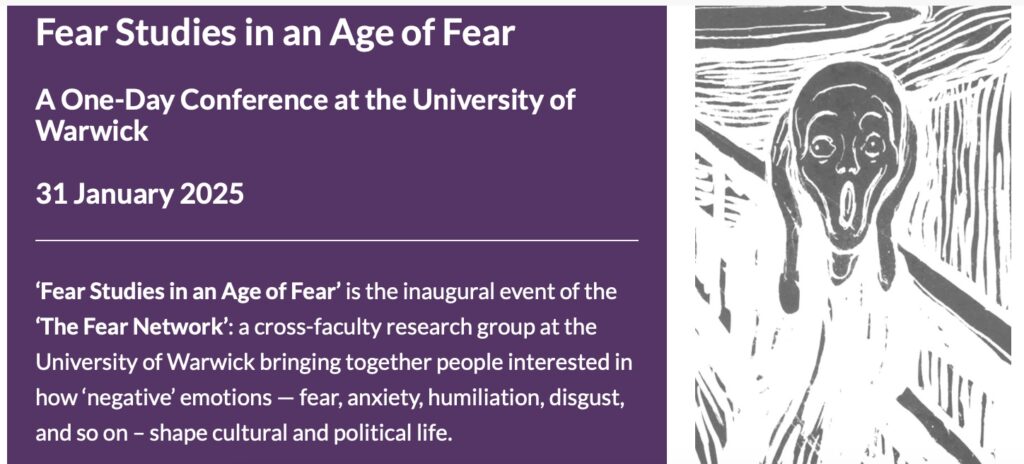I participated in the inaugural conference of the new Fear Network at Warwick University. This is a truly interdisciplinary network that tries to understand fear from a number of different disciplinary perspectives: cultural, psychological, anthropological, judicial etc. The theme of the conference “Fear Studies in an Age of Fear” opened up the conversation to both social-ecological breakdown and to the turn towards authoritarian politics and anti-science stances that can be noticed today.
My own paper focused on the prevalent trope of food scarcity and food abjection that can be found in many climate fiction texts published in North America. The food fears that inform these texts can be related to a fear that food will run out, causing starvation and great social tension. In novels such as Cormac McCarthy’s The Road or in films such as Snowpiercer by Bong Joon-ho, fear is also generated through the possibility that humans can become food, or that they will be forced to consume other humans. Finally, in Atwood’s Oryx and Crake, Denis Villeneuve’s Blade Runner 2049, or Alexandra Kleeman’s Something New Under the Sun, new types of food (lab-grown, severely gene-manipulated animals, artificially produced protein foods, or artificial water) are described as abject and potentially dangerous to consume. In this way, food and fear are extremely closely related in a lot of climate fiction from industrialized nations.
The paper I gave did not merely map this landscape, it also suggested that what generates fear in many of these texts is not necessarily the slow collapse of ecology, but rather the demise of the existing world-food-system. The point here is that the way people in many parts of the world are eating today is a result of the existing capitalist food-system. It is this system that erodes biodiversity by burning down rainforests to make room for palm oil plantations and cattle ranches, and that encourages the introduction of more and more artificial fertilizers and pesticides into the environment. This system is so dominant today that most people would not know how to acquire food if this global system collapsed. Also, such a collapse would mean the demise of many other privileges that the world-system generates for certain strata of people. Thus, what many climate fictions express is a fear that the system that literally feeds them in the present will fold into itself, bringing about all the abject behaviours and food items that these texts give shape to. By doing so, they are what I have called Climate Emergency Narratives.
Not all climate fiction tells this story. Interestingly, in Indigenous science fiction and climate fiction from what is often referred to as the Global South, the collapse of the world-food-system is not necessarily the end of food or eating, but a gateway to other and more sustainable ways of consumption. If people are not forced to produce cash crops such as coffee or cocoa for a global market, more sustainable types of food can be grown there. The end of one system does not need to be the end of everything. It can also be a beginning.

